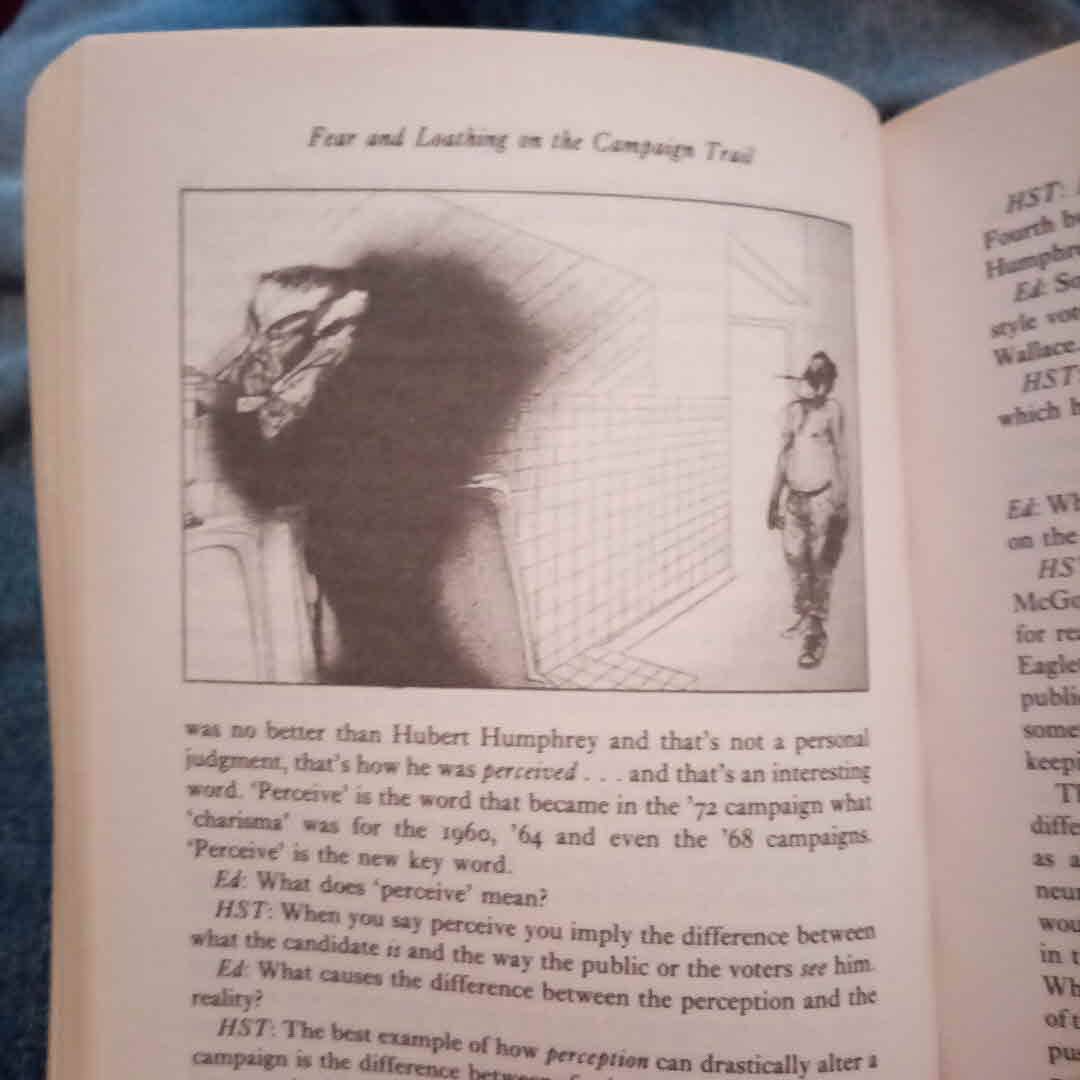
I love Ralph Steadman's illustrations but half a century later some of them just make me go
"What... Is going on here?"


I love Ralph Steadman's illustrations but half a century later some of them just make me go
"What... Is going on here?"
'The thing the political bosses want most is for young people to drop out... Because they know the young people can change the system, and the bosses don't want any change.' -George McGovern
I started reading this and one thing is really distracting to me: it's using the framing device of being Bram Stoker's journal, but everything about it is deeply American. The way it's narrated, the spellings, the way Dublin is discussed, and the absolute worst is the dialogue. It'll mention Dublin Castle or whatever, then Cletus Stoker will say something and I'll be like “wait, where is this set? Mid 19th century Ireland or Mayberry?“
I'm currently reading On The Road, but I've recently come into possession of another copy of F&L and I'm tempted to reread it. How it works is I'll get a copy, keep it on me at all times, read and reread it cover to cover, then inevitably hand it off to the uninitiated. It's just a matter a time until I dive back into the habit haha
I used to have atrocious performance anxiety and trouble writing, and while it's not completely dealt with I'm certainly on the path. This should be book #1 for green writers as it focuses on productivity first and foremost, and for olde writers it it an 86 year old call-out post.
Not perfect, but definitely an enjoyable read. The Mask is a fantastic story which everyone should at least give a read. My thoughts as I finished the book were how customs change over time and locale, but humans are humans all the same.
I've just started reading it, and the age of the book (first published in 1895) is throwing me in weird ways. The first story is set in the 1920s and mentions a war with Germany and it took me a second to realize that was just a reasonable assumption lol it also mentions a character using brandy as a chest rub and I can't tell if that was actually a thing people did
Money poisons you when you've got it, and starves you when you haven't.
One review of this stuck with me, that commented on how, while most authors are concise with their words, Behan allows his to roam freely. It is a deeply charming book, showing friendship and cheer existing even in bad circumstances. Deeply human, I'd highly recommend this autobiographical coming of age story
This was a quick read for me, I couldn't put it down and finished it in two days. The storytelling is tight and uses multiple perspectives so it feels fresh with every chapter. While, for the most part, the pacing and characterization is flawless, the third act is weak. It feels as though Doyle had a different ending planned and was pushed to change it by the publisher.
It's hard to sum up what makes this story so amazing. It's vibrant, thought provoking and, while it confronts the difficulties of the human condition, it is ultimately optimistic. This is one of those stories where you just need to go start reading it; you'll instantly understand what I mean as you're sucked into the writing.

This is just speculation, but I have an inkling as to why Litfluence starts at 42...
Tolstoy based a lot of his characters on people he knew, and if I remember correctly he refused to say what character he based on his aunt. There is, however, an elderly aunt character at the first party that he spends a full paragraph ripping the piss about; it makes me laugh every time I think about it, just an unnecessary amount of narrative contempt.
No sympathy for the devil, keep that in mind. Buy the ticket, take the ride. And if things get heavier than you expected, chalk it up to forced consciousness expansion. Tune in, drop out, get beat.
I would class this as following a through line of Henry Miller, the Beats, and Hunter S Thompson. This raw and honest book (I'm not sure novel is the right word) will make you laugh, cry and think. Ranging from anecdotes to philosophical musings, Threshold scratches the itch for Gonzo journalism. If you liked Fear and Loathing, you'll love this book!
War and Peace is not a novel, Tolstoy said it himself. The way it reads to me is as a serialized story, the same way telly series are structured. I think it'd make an excellent adaptation.
This book is considered essential reading for reporters covering the American presidential election; intending this to be his only excursion to the campaign trail, Thompson pulls no punches and doesn't fear burning bridges to deliver how he sees American politics to work. Without the cynical insights of this book, I wouldn't be able to comprehend the last four years of American electoral politics, or politics as a whole.
I'll go through a phase where I'll get a new copy of Fear and Loathing, have it constantly on me as I read it over and over, until inevitably passing it on like gospel to someone new. It is not enough to call it a snapshot of history, although it does capture the fallout from the hope of the 60s as Thompson seeks and fails to find the American Dream, it is a constantly entertaining and insightful look on the self-destructiveness in modern society.